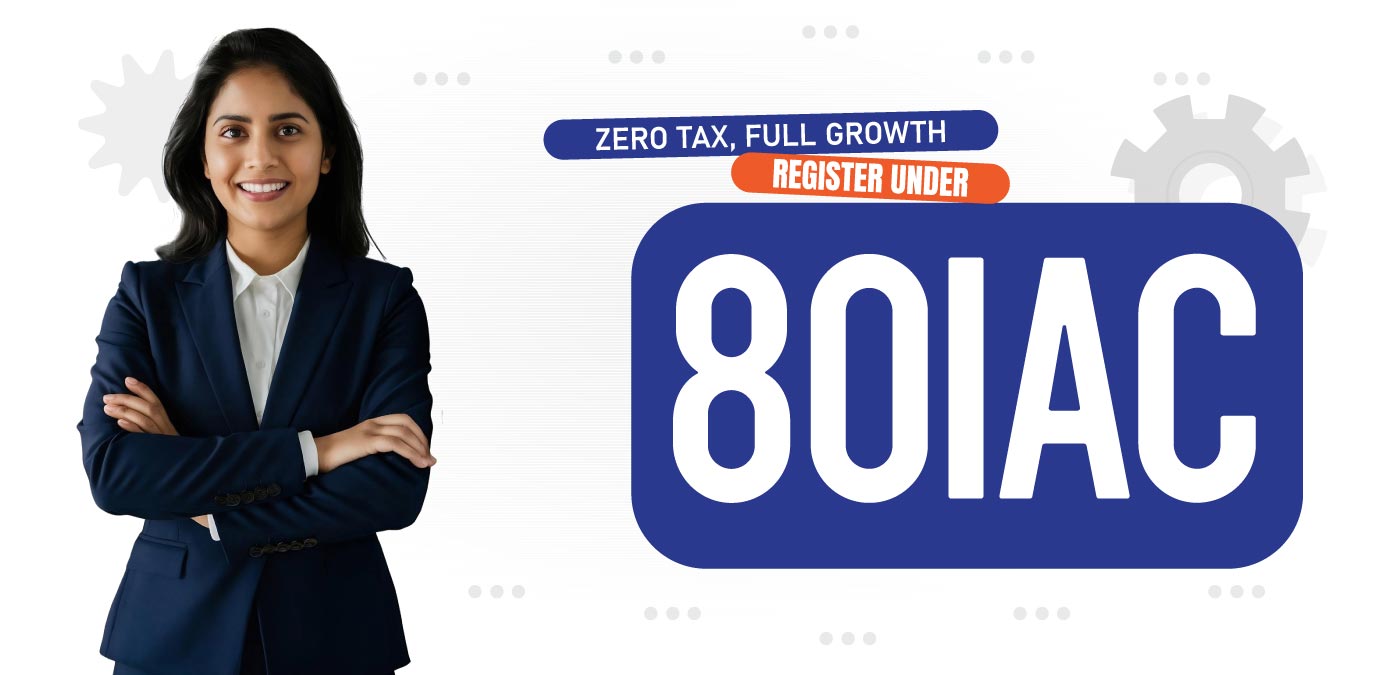-
What is the 80IAC tax exemption for startups?
The 80IAC tax exemption allows eligible startups to claim a 100% income tax deduction on profits for any three consecutive years out of the first ten years of incorporation.
-
Who is eligible to claim the 80IAC tax benefit?
Key forms include MGT-7A, AOC-4, ADT-1, and the Income Tax Return (ITR-6).
-
What is Form MGT-7A?
Startups must be recognized by DPIIT, incorporated as a Private Limited Company or LLP after April 1, 2016, and have turnover not exceeding INR 100 crores in any financial year.
-
Is DPIIT recognition mandatory for 80IAC exemption?
Yes, DPIIT (Department for Promotion of Industry and Internal Trade) recognition is mandatory before applying for the 80IAC deduction.
-
Can an LLP claim the 80IAC exemption?
Yes, Limited Liability Partnerships (LLPs) that are DPIIT-recognized and meet other criteria can also claim the 80IAC tax benefit.
-
How many years of exemption does Section 80IAC provide?
The exemption is available for three consecutive financial years within the first ten years of incorporation.
-
Can I choose which three years to claim the deduction?
Yes, eligible startups can select any three consecutive years within the 10-year window to claim the deduction based on profitability.
-
What is the maximum turnover allowed for 80IAC eligibility?
The startup’s annual turnover should not exceed INR 100 crores in any of the financial years since incorporation.
-
Does 80IAC apply to startups with foreign shareholders?
Yes, as long as the startup meets all other eligibility criteria, foreign shareholding does not disqualify it from 80IAC exemption.
-
What documents are required for the 80IAC application?
Documents include the Certificate of Incorporation, PAN, audited financials, board resolution, and DPIIT recognition certificate.
-
What is the process to apply for 80IAC exemption?
The process involves DPIIT recognition, compiling financials, applying online through the Income Tax portal, and submitting required documents to the CBDT.
-
Is approval from the CBDT required for 80IAC deduction?
Yes, once the application is submitted, the CBDT reviews the documents and grants approval for claiming the exemption.
-
Is there a deadline for applying for the 80IAC exemption?
There is no fixed deadline, but it is advisable to apply before the financial year in which you wish to claim the exemption.
-
Can an unprofitable startup apply for 80IAC?
Yes, but the exemption can only be claimed in years where the startup generates profits, as the benefit is a deduction on taxable income.
-
Will the startup receive a certificate after approval?
Yes, upon approval, the CBDT issues a certificate or confirmation which enables the startup to claim deductions while filing income tax returns.
-
Are startups in all sectors eligible for 80IAC?
Most sectors are eligible, but the startup must be working towards innovation, development, or improvement of products or services, or have a scalable business model.
-
Can the 80IAC benefit be claimed before CBDT approval?
No, the startup must wait until it receives approval from CBDT before claiming any deduction under Section 80IAC.
-
What if my startup misses filing the application for 80IAC?
If you miss applying within the intended year, you can still apply later and claim the benefit in the upcoming profitable years within the 10-year period.
-
Can a startup lose its 80IAC approval once granted?
Yes, if the startup violates any conditions, such as exceeding turnover limits or changing business nature, the approval may be revoked.
-
How long does it take to get approval for 80IAC?
The approval timeline can vary, but it typically takes 2 to 3 months after submission, depending on document verification and response time from authorities.
-
Can I apply for 80IAC without professional help?
You can, but professional guidance ensures accurate documentation and better chances of approval, especially for new or early-stage startups.




 Your Compliance Manager will assist in preparing declarations and submitting your application on the Startup India Portal for DPIIT recognition.
Your Compliance Manager will assist in preparing declarations and submitting your application on the Startup India Portal for DPIIT recognition. Once recognized, our experts will draft the 80IAC application, ensure document compliance, and file it with CBDT through the Startup portal.
Once recognized, our experts will draft the 80IAC application, ensure document compliance, and file it with CBDT through the Startup portal. We track the status and keep you updated. Upon approval, your 80IAC Tax Exemption certificate is issued and shared with you.
We track the status and keep you updated. Upon approval, your 80IAC Tax Exemption certificate is issued and shared with you.



